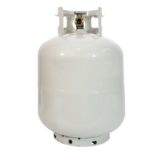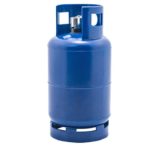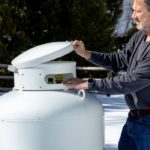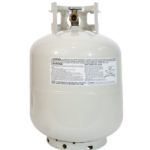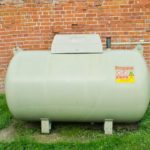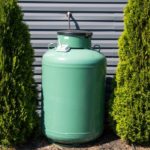As a propane tank owner, one of the issues you’ll most likely face at some point is a frozen tank, especially if you live in a cold climate. If your tank freezes, you might lose access to the propane inside, and that certainly isn’t something you want to happen when the weather is severely cold. This is why it’s essential to know what to do if your propane tank freezes.
If your propane tank freezes, stop using it and wait for it to thaw out before resuming use. You can either take it inside for the night or cover it with a heating blanket. To prevent the tank freezing at all, you should inspect the tank regularly, clear away any ice, and keep it insulated.
If you keep your propane tank well protected from the cold, you shouldn’t have to worry about dealing with a frozen tank. Let’s take a look at why your propane tank freezes over, what happens when it does, and how you can prevent it from happening in the first place.
What Happens When Your Propane Tank Freezes?

Propane itself won’t freeze, but extremely cold temperatures can still affect it, and a frozen propane tank is one you don’t want to deal with. Keeping your propane tank outside doesn’t seem like a big deal, but it may allow the tank components to freeze.
When the weather turns cold, snow may settle on the valve, handle, or regulator, and it may cause these parts to get extremely cold, so cold they’re not longer within the temperature range they’re designed to be used at. If you’re in an area that’s both cold and sunny, you can try painting your tank black with some cheap outdoor paint (on Amazon) to let it absorb solar heat to prevent freezing.
Your tank can develop these issues even if it’s enclosed. A humid atmosphere can cause condensation to accumulate on the tank and freeze overnight. This can cause the propane valve handle or valve stem to become stuck, preventing you from using the tank. In addition, the regulator’s vent hole might become blocked, which means you won’t be able to draw gas from the tank.
Cold temperatures cause propane to contract. Your propane tank’s pressure will decrease when it’s extremely cold outside due to the loss of propane volume. Low pressure, in turn, prevents the propane in your tank from reaching your gas burner.
So, an almost-empty tank will probably act like it’s totally empty if it’s cold enough. In this situation, you may not be able to operate your propane equipment, such as your boiler and furnace. Sounds bad, right?
What Else Causes the Propane Tank to Freeze?
It’s not just cold weather that causes propane tanks to freeze. Since the liquid propane inside the tank is under pressure, it can’t boil. Opening the tank valve causes the pressure to drop and the liquid to evaporate. The tank wall absorbs heat from the atmosphere, which causes the metal to become instantly cold as the heat is removed.
A layer of frost forms on the metal tank when the humidity from outside condenses and freezes. At the liquid level or the liquid line, ice accumulates.
As pressure rises and falls, so does the temperature. When a large volume of vapor passes through the valve of the propane tank, the pressure drops quickly. This causes the temperature to decrease and the outside of the tank to become cold. Since the tank’s liquid level is so low, the humid air will freeze or frost.
That’s why you should always keep your propane tank warm and full of propane when the weather is cold. Doing this will increase the pressure in the tank and prevent your tank from freezing over.
What Should I Do When My Propane Tank Is Frozen?
When your propane tank is frozen, all you have to do is stop using it and allow the tank to thaw before turning it back on. You can detach the regulator from the propane tank and take the tank inside overnight for it to absorb heat from your house. By the next morning, it should be fine, and you can reattach the regulator.
As we’ve mentioned earlier, you can also cover up the tank with a heating blanket.
How To Prevent a Propane Tank From Freezing
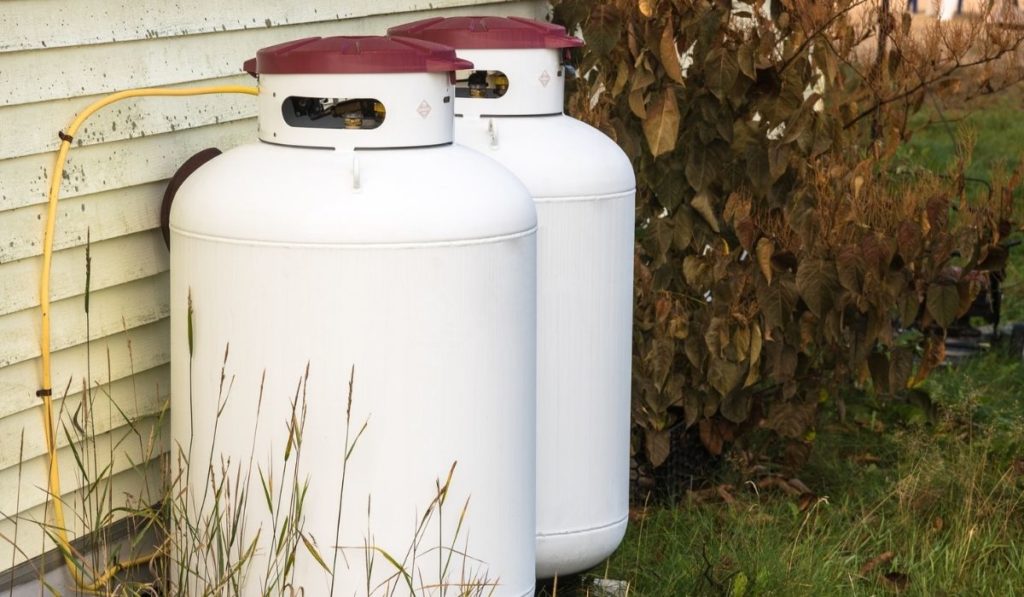
As winter approaches, the best thing you can do is to prevent your propane tank from freezing. This will keep your tank in optimum condition, and you wouldn’t have to worry about thawing any frozen tank.
The following are ways to prevent a propane tank from being affected by the cold.
Check the Pressure in the Tank
It’s always a good idea to keep your propane tank adequately filled in cold weather. The pressure in your propane tank can drop if it isn’t filled, causing it to freeze. You should fill your tank up to keep the pressure constant.
Insulate Your Propane Tank
Just like humans need to stay warm during winter, so too does your propane tank. To do this properly, cover the propane tank with a heating blanket like the Powerblanket PBL20-20 (on Amazon). Avoid using hot water, a blow torch, or a space heater to insulate your tank.
Inspect the Regulator Vents
If you get snow or ice in your area, there’s a high chance that they could get into the regulator vents and damage the propane tank. Inspect the regulator vents to confirm that there’s no ice or snow stuck in them. If there is, you should reach out to a professional to fix it.
Clear Off Snow or Ice With a Broom
If there’s snow or ice on your propane tank and you have to clear it off, you should use a broom or something similarly soft. Using anything tougher than that could damage the tank.
Clean your Propane Tank Properly
As you clean off your tank, ensure you don’t get any snow or ice on any part of the propane tank, such as the meters, valves, or pipe.

